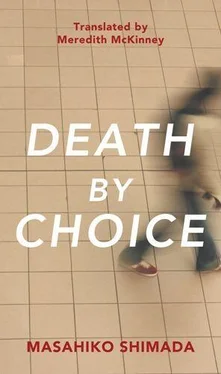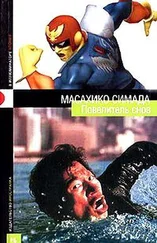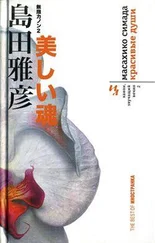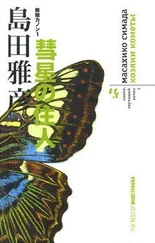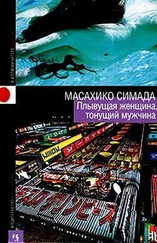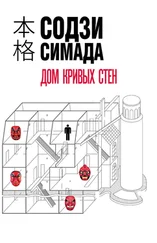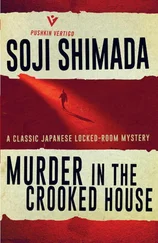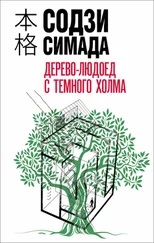Kita seemed to be the oldest among them. The youngest-looking was a lad of sixteen or seventeen, and his appetite was quite intimidating. He didn’t have a spare ounce of flesh on him, however. His face was childlike, and smooth and white as a boiled egg. Mitsuyo referred to him as Calpis. In reply, he referred to her with casual deference by her first name, in a voice still hoarse from having only just broken. Kita later learned they were cousins.
“Why are you called Calpis?” Kita asked him casually. “That’s the name of a milky soft drink, right?” All four girls promptly burst into laughter.
Calpis was a shy lad who seldom spoke, just ate, and occasionally nodded to others with a face innocent of any wrongdoing. But the other man both ate a lot and talked a lot. He wasn’t as good-looking as Calpis, but his dexterous way of seeing to the needs of the girls with talk and attention was a great hit. Still, they sometimes ignored him. Whenever this happened he looked hugely put out, and did his best to get in on their conversation at every opportunity with a constant flow of “Why?” or “I see,” or “Really?” As if this wasn’t annoying enough, his cell phone would ring every half hour or so. The girls called him Daikichi. Daikichi was obviously senior to Calpis in the way they related. As for the girls, one by the name of Takako was Calpis’s girlfriend, while another, who they called Poo, a girl barely five feet high with a thirty-six-inch bust, evidently worked part-time in the same place as Takako did. Then there was a rather unassuming girl who lurked in the background, who had the name Zombie. This was apparently the girl of the four failed suicide attempts that Mitsuyo had mentioned, who was usually so cheerful. She was fine-boned and her voice was frail, but she looked at people with a calm gaze.
It seemed odd to Kita to find himself in among this bunch of people, but it was only for tonight, he told himself, so he sat letting the conversation flow on around him, watching and comparing faces.
Daikichi: I went along to one of those cheap Osho restaurants that do Chinese dumplings the other day, and ordered up a great big dish of noodle stew. Usually those Chanpon stews cost around seven hundred yen, yeah? But this one was only three sixty!
Poo: Wow, that’s cheap!
Daikichi: Usually you get lots of shellfish in Chanpon, but this one had pork and bean sprouts and meat dumplings and all sorts of things. It was kinda fun fishing around in it to see what you pulled out. There was even some fried chicken in there. It had tooth marks in it.
Takako: What? You mean to say they topped it up with other people’s leftovers?
Poo: Cheap can be pretty nasty.
Takako: Good thing there weren’t any cigarette butts, at least.
Daikichi: You hear of gangsters bringing along a cockroach and popping it in the food they’re eating, you know.
Poo: Yeah, one did that in the bar where I work. Hey, he says, what kinda place is this? You put cockroaches in the food here or something? Trying to make trouble.
Daikichi: To hell with ’em. They must breed the things at home.
Zombie: I never saw a cockroach till I came to Tokyo. We never had them in Hokkaido.
Daikichi: That so? You get them in ramen noodle shops, I heard.
Takako: Talking of ramen , I heard there are lots of Iranians that just love pork. They can’t believe how delicious it is, apparently.
Daikichi: But Moslems aren’t allowed to eat pork, surely?
Poo: Yeah, but the more you’re not supposed to eat something the more you want to eat it, see? Like me, whenever I’m on a diet I dream of ice cream.
Daikichi: I wonder if there’s some religion where you’re not allowed to eat cucumbers or aubergines.
Mitsuyo: Some girls just go all wet as soon as they see a cucumber or one of those long aubergines. And there are guys who come just looking at an oyster or a shellfish, or konyaku jelly.
Calpis: Not me!
Daikichi: But when you want a shit you always get a hard-on, don’t you?
Takako: Hey come on guys, we’re eating!
Calpis: Well it’s not that I…hey, you’re having me on. And anyway, who was it who dropped all his spare cash in Kinshicho the other day?
Mitsuyo: Daikichi! You may not be a hit with the girls, but that doesn’t mean you should go living it up in cabarets you know.
Daikichi: Well if that’s how you’re going to be, come on and scout me for one of your movies then. You promised you’d use me as the male star in one of those clips of yours, didn’t you?
Mitsuyo: Hey, what do you think of Poo?
Poo: Eh? I’m an out and out people hater, you know.
Zombie: Oh wow, you guys are all really living hard, aren’t you?
Takako: Seems like there’s something wrong with living hard.
Zombie: You don’t want me around?
Takako: I didn’t say that. You were behind Mitsuyo in the same high school, weren’t you Zombie?
Zombie: Yeah. I wrote to her when I saw her in one of her videos. And she really looked after me when I came to Tokyo.
Daikichi: But you’re smart, Zombie. Didn’t you do literature or something at Keio University?
Takako: There were lots of really unusual, talented people at Mitsuyo’s school.
Zombie: There’s also this really sharp-tongued guy who you see on discussion programs, he’s from our school too.
Mitsuyo: And there’s that actress who used to be in one of those morning drama series on TV a while back, who does whiskey commercials now – she was about five years ahead of me at school. And I heard of another girl about fifteen years older, she attacked the American embassy with a stick of dynamite.
Takako: That’s the kind of place Hokkaido is.
Mitsuyo: Whaddya mean?
Takako: I mean there are actresses and critics, and literary types like Zombie, and I guess terrorists… you get a lot of people who throw dynamite at the American embassy up that way?
Mitsuyo: What school were you at?
Takako: I was at a mission school in Yokohama.
Mitsuyo: You mean like Felaccio Girls School? Well then, I guess you’d only find office girls and housewives from there.
Takako: No way. You ever heard of the manga artist Hiyoko Kannazuki?
Zombie: I know her! She did that story about the girl who had one hundred eight disastrous love affairs.
Takako: You read Kannazuki’s latest?
Zombie: Sure. The girl starves to death from anorexia.
Daikichi: You could find one or two odd guys who graduated from my school too, if you looked.
Calpis: We had that weird headmaster, didn’t we?
Daikichi: Oh yeah, old Jomon. Named after that prehistoric Japanese period. He was really weird.
Poo: What kinda guy was he?
Daikichi: He graduated from the Nakano Military College.
Poo: Eh? What kinda school is that?
Daikichi: The place Onoda went to.
Takako: Onoda? Who’s Onoda?
Daikichi: That soldier who didn’t know the war had ended and stayed holed up in the jungle in Sumatra for thirty years.
Calpis: It wasn’t Sumatra, it was Lubang.
Poo: You mean he went on fighting all by himself for thirty years?
Daikichi: He lived like they did back in the Jomon Period. The Nakano Military College is the kinda place where you’re taught to survive anywhere, even in the jungle. Our headmaster was like a Jomon guy too.
Calpis: He used to teach his students weird stuff. Like how to dig a tunnel just with a stick, or how to make a house by cutting down a single tree, or how to get water from grass, or how to tell which herbs and stuff you can eat.
Daikichi: It’s called “survival technique”. He always said it would come in handy some time.
Mitsuyo: You’ll probably find it useful when you turn into tramps on the street.
Читать дальше
